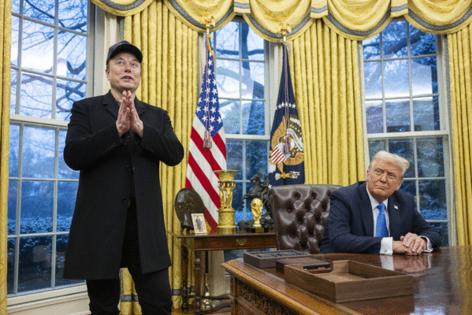Commentary: Elon Musk and the dangerous myth of omnigenius
Published in Op Eds
Elon Musk’s misadventures with DOGE might be the ultimate example of a powerful flaw in how we think about leaders. That’s our tendency to believe skills and accomplishments are portable, that someone who excels in one venue will be just as impressive in others. I call this exceptional — if imaginary — superpower “omnigenius.”
In reality, though, success doesn’t exist without context. While there’s no pleasure in watching Musk make a mess of the U.S. government, maybe it will help clarify the crucial link between the two.
Musk and DOGE show how a leader can be empowered by the omnigenius fantasy. Musk has surely done remarkable things. For all Tesla Inc.’s current struggles, it transformed the automotive sector. And it’s almost impossible to overstate SpaceX’s revolutionary impact on the space industry.
Once he joined the government, though, the story changed. In just one notable example, DOGE fired hundreds of employees at the National Nuclear Security Administration, the agency responsible for the production and security of nuclear weapons and management of nuclear waste sites. But the Trump administration reversed many of the cuts less than 48 hours later, when it became clear what these workers did and how important their roles are. “The DOGE people are coming in with absolutely no knowledge of what these departments are responsible for,” said Arms Control Association Executive Director Daryl Kimball at the time.
Similarly, cuts to programs providing healthcare for 9/11 responders and survivors were later reversed, as were those to Social Security offices. Even DOGE’s website had to delete all five of its biggest claims to savings after media organizations pointed out they were wrong.
Whatever you think of DOGE, we should all agree that accidentally damaging the agency in charge of American nuclear weapons is incompetent execution. And Musk isn’t alone. It’s become routine to see people with private sector successes deferred to as they regurgitate Russian propaganda on Ukraine or spread debunked anti-vaccine theories.
This isn’t just about business — the omnigenius myth runs deep in our culture. In Walt Disney Co.’s Marvel Comics Universe, Bruce Banner remarks that he has seven PhDs, an (absurd) shorthand for his multifold genius. (Having personally done just one, the prospect of earning a second could turn me into a giant green rage-monster, too.) On TV, how many times have you watched a character who’s an expert in “science,” do everything from sequence DNA to hack a computer? And don’t forget the celebrities many of us trust to sell us everything from snacks to cars to prescription drugs.
But outside of the arenas that brought them success, why do we listen to these people? And why should they get positions of power in areas where they have little knowledge or experience?
The explanation lies in a cognitive bias known as “the Halo Effect,” a phenomenon where having one major positive quality tends to skew our perception of someone’s other characteristics. That’s because we often correlate unrelated characteristics, such as intelligence, attractiveness, social skills and loyalty. So if someone is, for instance, particularly attractive, there’s a tendency to rate them as more intelligent, even with no evidence to suggest that’s the case.
The halo effect makes us attribute success solely to the person, rather than to the combination of that person and the context he or she inhabits. But context is, virtually always, overwhelmingly important.
This is why leaders who switch industries usually struggle. John Sculley sold soda brilliantly at PepsiCo Inc. but nearly derailed Apple Inc. Ron Johnson revolutionized retail at Apple, then tanked JCPenney. In both cases, the CEOs’ latter companies lost more than half their market value during their leadership. Harvard Business School Professors Boris Groysberg and Nitin Nohria looked at people recruited from GE (at the time the pinnacle of American management) to be CEOs of other companies. They found that the leaders succeeded only when the challenges facing their new employer were similar to those they’d encountered at GE.
Context is so important that it has a huge effect even when people move within an industry. Other research by Groysberg showed that when most star equity research analysts change banks, their performance drops because the skills that allowed them to excel were actually bank-specific. And my own research shows that leaders who come from outside of a company (as opposed to being promoted from within) tend to produce high-variance outcomes: Sometimes they succeed brilliantly, but more often, they are disastrous failures.
Because of the importance of context, success in one area provides almost no information about someone’s ability to succeed in a different one. It is possible to change fields successfully. (Deion Sanders, after all, played in both the Super Bowl and the World Series.) But the odds aren’t good.
So, stop seeing haloes. Being a great investor or CEO doesn’t make someone an expert in foreign policy, biomedicine or tax rates. Success is important — but so is understanding that the limits of any one person’s abilities are usually much narrower than we think.
____
This column reflects the personal views of the author and does not necessarily reflect the opinion of the editorial board or Bloomberg LP and its owners.
Gautam Mukunda writes about corporate management and innovation. He teaches leadership at the Yale School of Management and is the author of "Indispensable: When Leaders Really Matter."
©2025 Bloomberg L.P. Visit bloomberg.com/opinion. Distributed by Tribune Content Agency, LLC.




























































Comments